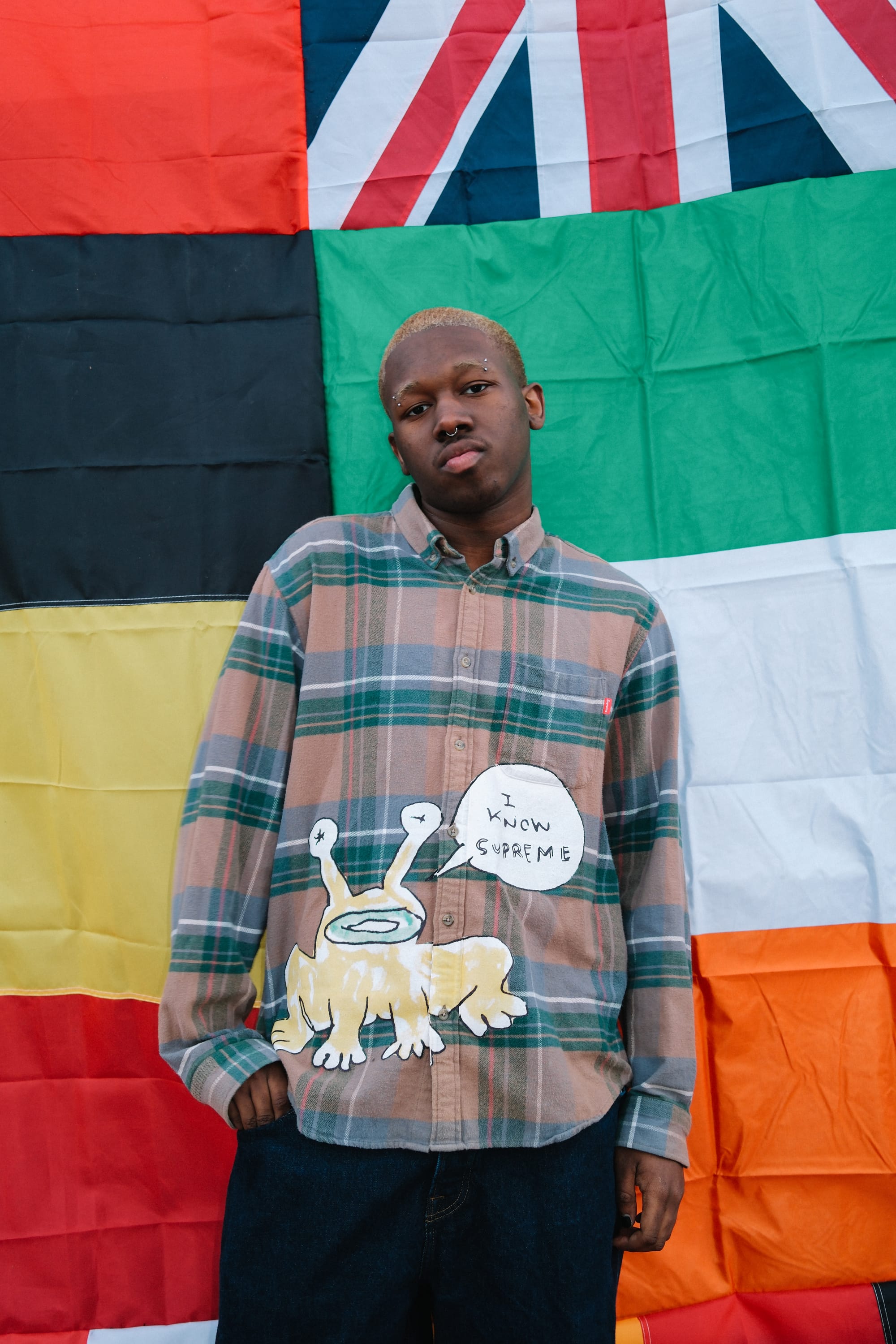FearDorian Is Smashing Through the Boundaries of Internet Rap
The 18-year-old Atlantan combines the pulse of club music and the vulnerability of emo to mesmerizing effect.

If things were different, FearDorian would be in college right now. But after graduating high school last May, he went all-in on music instead: making hundreds of beats, releasing a couple of full-length projects, and taking his sound—a bespoke blend of Milwaukee lowend, Midwest emo, vaporwave, and Atlanta staples like trap and snap music—across America and Europe on tour. Still, the decision weighs on him. At the top of his new album, Leaving Home, over a hypnotic instrumental that’s both contemplative and flossy, he raps, “Every day baby steps, dealing with that trauma/Every day a different trip when I should be in college.” Sitting in his first solo apartment earlier this month, he’s pleased with how life is going—especially since, during his adolescence not so long ago, his family was practically homeless and forced to live together in a hotel. “I already be having too much weighing on me in general, and school would only add to that,” he says. “Even though it would probably be fun as fuck, too.”
Dorian might not be criss-crossing the quad anytime soon, but his pad has some of the hallmarks of a dorm room all the same. There are posters of faves like Swedish rapper-producer and Drain Gang founder Bladee, Chicago indie-sleaze artist Groupthink, and Atlanta hardcore band Playytime; a mini-shrine dedicated to the experimental Arizona rap group Injury Reserve (Dorian and Injury Reserve member RiTchie dropped a mixtape, Quiet Warp Xpress, together late last year); and a poster of the animated Japanese pop star Hatsune Miku (Dorian once cosplayed as her). He points his iPhone camera toward his minimal production setup, where the prolific producer cooks up many of his beats. He says he’s made 233 of them in just the last few months, adding that the pace is slow for him.
In 2024, Dorian’s ranging style fully cohered on FearDorian, his self-titled solo debut, and A Dog’s Chance, a collaborative tape with Connecticut rapper-producer Polo Perks and Milwaukee’s AyooLii. The latter project led to promo opportunities in New York City last summer, though what should have been a victory lap turned into one of the most stressful times in Dorian’s life. His cat ran away shortly after he arrived in New York, and he was going through a bad breakup. His flight home was cancelled, so he had to scramble and hop on a train.
But the whole experience steeled him, and once he was back in Atlanta he resolved to take life by the tassels. He spent as much time as he could in the mix of Atlanta’s DIY scene, hanging with friends like the rapper-producer Quinn, and hitting every show he could. “That was my first summer as a young adult,” Dorian says. “I graduated, I’m living—I’m in the bitch. Let me experience life.”

Dorian Williams spent much of his childhood moving around Georgia, living with his mother, older sister, and grandmother. He credits his sister with exposing him to artists like Disclosure, Chance the Rapper, Dom Kennedy, and Nicki Minaj, which Dorian absorbed while charting his own path through indie rock. At school, he participated in dance competitions, cutting up to artists both popular (21 Savage, Robb Bank$) and more obscure (Summrs, Surf Gang). He started uploading footage of himself shimmying and juking onto the video app Triller, which brought him more attention. But eventually, he went from wanting to dance to music to wanting to make it.
By the time he was 13, the bones of his style were snapping into place. As a producer, many of his earliest tracks were bubbly and chaotic, akin to the digital explosions of plugg music. He provided beats for local artists like ATL Smook as well as out-of-town rappers like Chicago’s Ghoulaveli and Florida’s 454. But a big part of Dorian’s sound was cribbed from the Milwaukee rap scene, particularly the synthetic claps and blown-out drums of lowend. “They in this chaotic ass city, bro. Niggas stealing grandmothers’ cars and shit. It’s actually dangerous out there,” he says of the Wisconsin metropolis. “But their music is so fucking fun. They’re just breaking all the fucking rules. That carefree aspect really pulled me toward it.” He began working with AyooLii and other Milwaukee rappers while still in high school, budding into an internet-famous beatmaker in between math tests and gym class.
Leaving Home, which came out last week, includes a few heartracing, lowend-inspired tracks, alongside woozier experiments that seem born of late, lonely moments in hotels far from Atlanta. The majority of the album came about from Dorian’s travels, and it deals with the pros and cons of being a rising star constantly on the move. Being able to afford nicer things and feeling yourself a bit more is great, but those pluses don’t erase the tug of neglected friendships and the realization that your dream destinations might not live up to your own expectations. At various points on Leaving Home, Dorian finds himself despondent in California, smoking pack in Montreal, and voguing under the Eiffel Tower.
Almost entirely self-produced, the record shows Dorian’s ambitions expanding even further into the vastness of the rap internet. The beats range from hazy drums and pastel synths pulsing through the mud to Jersey club renditions of moody jazz staples to blends of Midwest emo and trap. It’s clear where the shuffling feet and swaying arms fit on songs like the spritely “Every Time” or the explicit club homage “Pray 4 the People.” But even moodier songs like “I.V.,” which is little more than a stray synth line and pounding drums with some haze floating above, feel ready for a slight shimmy at a silent disco. “Because I used to dance, I think—even subconsciously—about moving when I make music,” he says. “Even if I don’t seek out something club-inspired, it usually ends up that way anyway.”
Dorian’s clashing confidence and anxiety teem beneath the surface of the album. “It’s Leaving Home in the sense that I left home,” he explains. “But it’s also leaving home in the sense of how you were raised, the routines you’re used to, your mentality. I’m breaking away from those things and becoming my own person.” Two weeks after he tells me this, he proves it at his album release show in Brooklyn. Surrounded by a galaxy of collaborators and throngs of fans, his sweetly menacing beats pounding like cannon fire, Dorian takes a puff from his inhaler before he prepares to crowd-surf. “Y’all got me if I do this?” he asks winkingly, as a sea of hands form before him. As he takes the leap of faith, the intention of the moment becomes clear—this is a coronation, self-actualization by mosh pit.





